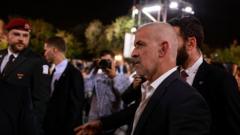The standoff between Israeli PM Benjamin Netanyahu and Shin Bet head Ronen Bar has escalated, revealing mutual accusations of lies amid a politically charged environment. While Netanyahu cites Bar's professional failures as grounds for dismissal, Bar alleges political motivations, igniting public protests and deepening societal rifts in Israel.
Tensions Rise as Netanyahu and Shin Bet Chief Clash Over Dismissal

Tensions Rise as Netanyahu and Shin Bet Chief Clash Over Dismissal
The ongoing confrontation between Israel's Prime Minister Benjamin Netanyahu and Shin Bet chief Ronen Bar reveals significant divisions within Israeli society and raises questions about political integrity and intelligence oversight.
The conflict between Israeli Prime Minister Benjamin Netanyahu and Shin Bet's chief Ronen Bar continues to escalate, shedding light on the fractious political climate in Israel. Following the announcement of Bar's dismissal last month, heated accusations have surfaced as both parties take their claims to the Supreme Court, which has temporarily halted the firing.
In recent court documents, Netanyahu lambasted Bar as deceptive, claiming he was dismissed for professional inadequacies, while Bar contends his removal was driven by political motives and personal grievances. Bar's claims specifically include allegations that Netanyahu pressured him to prioritize loyalty over law enforcement, urging Shin Bet to surveil anti-government protesters. This has sparked fear among many Israelis about the potential overreach of governmental authority.
Public dissent erupted last month against Netanyahu's overtures regarding Bar's termination. Many protesters have accused the administration of diminishing judicial power, a sentiment that was brewing long before the outbreak of the recent Gaza conflict ignited by Hamas.
Netanyahu's affidavit directly contests Bar's account, calling it a "complete lie," and attributing the failures that occurred before the October 7 attacks directly to Bar's leadership. In contrast, Bar’s rebuttal portrays Netanyahu’s statements as rife with inaccuracies and misrepresented quotations intended to distort reality.
As counter-protests emerged around the Supreme Court, the court now faces an urgent challenge: to determine which of the conflicting narratives holds more weight or create a compromise that might encourage Bar to resign amicably. The tension between Netanyahu's hard-line supporters who advocate for a rigorous approach to the Gaza situation, versus those who argue for prioritizing hostage negotiations, reflects wider societal upheaval in Israel.
The implications of this standoff extend beyond the individuals involved; they highlight the increasingly polarized state of Israeli politics and the delicate balance between national security and civil rights.
















